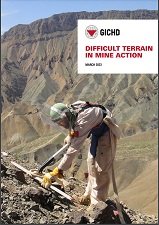Armed conflicts continue to cause an increase in the number of casualties from explosive ordnance. Even after hostilities have ended, populations living in mine-affected areas often live with the risk posed by mines and other explosive ordnance. In order to better define hazardous areas and promote efficient, effective and safe processes and procedures, land release (including non-technical, technical survey and clearance procedures) has been developed by mine action organisations allowing populations to come back safely on their land.
Over the past few years, the issue of land release in difficult terrain has been raised in many countries around the globe, slowing down progress in meeting obligations under international treaties and conventions and resulting in a slower release of the land back to the community. Difficult terrain is land where inflexible physical constraints or human factors make it challenging to access worksites and hinders the use of preferred land release methods in mine action. There are several factors that could hinder land release operations, including: security, remoteness, topographical difficulties, meteorological constraints, legislation, and cultural sensitivities, making land release procedures even more challenging.
The GICHD study on ‘Difficult terrain in mine action’, conducted in 2021 – 2022, highlights some of the main challenges associated with the difficult terrain in several affected countries and territories. The study provides examples of good practices and adaptive innovative solutions, with the aim to support and encourage the mine action community to continue learning and sharing knowledge, to successfully mitigate difficulties related to terrain and ultimately, improving efficiency, effectiveness, and safety in land release operations.
This study is the first phase in a series of research initiatives to be conducted by the GICHD, with further publications expected to cover specific aspects of the topic of difficult terrain in mine action.
Category: Operations Management

